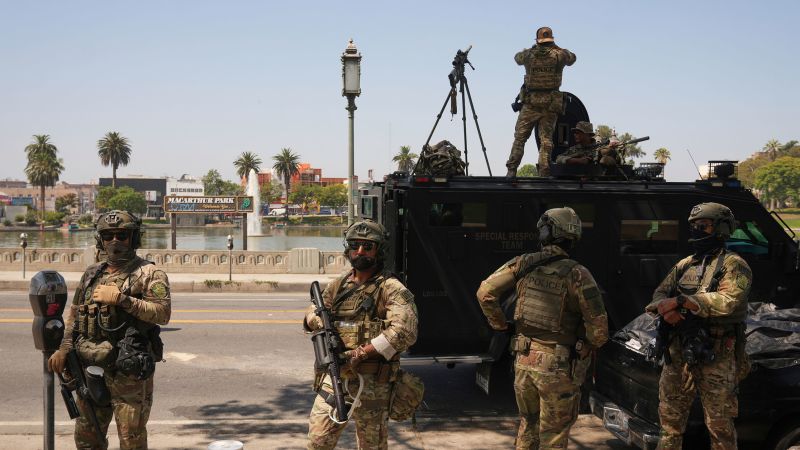Federal Judge Orders Stop to Discriminatory Immigration Raids

Indiscriminate Immigration Raids in Los Angeles - A Civil Rights Violation
In recent years, civil rights groups have raised concerns over the actions of ICE and Border Patrol agents in Los Angeles. These groups allege that the agents are targeting individuals based on their race and denying them access to legal representation. This has resulted in a wave of fear and mistrust within the immigrant community.
The Federal Judge's Ruling
Recently, a federal judge ordered a stop to these indiscriminate immigration raids, citing evidence that their actions are illegal. This ruling is a victory for the immigrant community and a step towards protecting their rights and dignity.
The Impact of Indiscriminate Immigration Raids
These raids not only violate the civil rights of immigrants but also have a negative impact on the community as a whole. They create a culture of fear and division, making it difficult for immigrants to access
About the Organizations Mentioned
ICE
**Immigration and Customs Enforcement (ICE)** is a federal law enforcement agency under the U.S. Department of Homeland Security (DHS), established in 2003 following the Homeland Security Act of 2002, which reorganized existing agencies post-9/11 to enhance national security[1][2]. ICE’s core mission is to protect the United States by enforcing immigration laws, conducting criminal investigations, and preserving public safety. ICE operates primarily through two major divisions: **Homeland Security Investigations (HSI)** and **Enforcement and Removal Operations (ERO)**. HSI focuses on investigating and disrupting transnational criminal organizations involved in customs violations, human trafficking, terrorism, and smuggling. ERO is responsible for the apprehension, detention, and deportation of individuals unlawfully present in the U.S., operating detention facilities and managing removal procedures[2]. ICE’s international reach is managed by the Office of International Affairs (OIA), a key overseas investigative arm coordinating with foreign governments to combat cross-border crime, such as arms smuggling, forced labor, and immigration fraud. OIA supports intelligence gathering, training, treaty implementation, and facilitates global cooperation to preempt threats before they reach U.S. borders[3]. With a workforce exceeding 20,000 employees across more than 400 offices worldwide and an annual budget of about $8 billion, ICE plays a pivotal role in U.S. homeland security[1]. Its activities, especially those involving immigration enforcement and detention, have made it a highly visible and sometimes controversial agency in public discourse, often referred to colloquially in Spanish as "la migra"[2]. Notable achievements include disrupting large-scale criminal networks internationally and supporting the enforcement of over 400 federal statutes concerning customs, immigration, and terrorism prevention. ICE’s dynamic operational scope—spanning law enforcement, international diplomacy, and legal administration—makes it a critical component of U.S. efforts to maintain national security and uphold the rule of law[1][2][
Border_Patrol
The **United States Border Patrol (USBP)** is a federal law enforcement agency under U.S. Customs and Border Protection (CBP), focused on securing the United States' borders against illegal entry and contraband smuggling. Established to detect and prevent unlawful crossings by land, sea, and air, the USBP plays a critical role in national security by apprehending terrorists, human smugglers, and drug traffickers, while also working to reduce crime in border communities[1][2]. Historically, the Border Patrol has evolved into one of the largest U.S. law enforcement agencies with nearly 20,000 agents as of 2019. It operates under a national strategy emphasizing operational control of the border, leveraging “smart border” technologies and tactical units like the Border Patrol Tactical Unit (BORTAC) and the Search, Trauma, and Rescue Unit (BORSTAR), which together form the Special Operations Group (SOG) headquartered in El Paso, Texas[1][5]. Key achievements include its integration into CBP in 2003, a pivotal reorganization that consolidated immigration enforcement and customs functions under the Department of Homeland Security. This restructuring enhanced coordination among agencies and expanded capabilities to address modern threats. The USBP's commitment to innovation and tactical readiness has been recognized publicly, exemplified by ceremonial honors such as ringing the New York Stock Exchange closing bell in 2019[5]. Currently, the USBP continues to face significant challenges, including frequent assaults on agents and threats from organized crime groups, with intelligence reports of bounties placed on officers. To support its mission, the U.S. Northern Command provides military assistance in surveillance and rapid response along the southern border[1][6]. Notable aspects of the Border Patrol include its broad legal authority to arrest noncitizens violating immigration laws and enforce criminal statutes related to border security, all while balancing constitutional rights during enforcement actions[3]. Its operational complexity and crucial role in national safety make it a key subject of interest in










